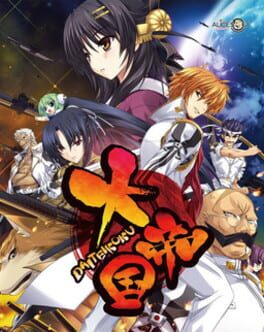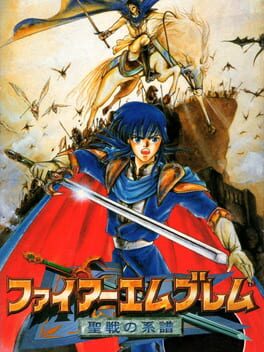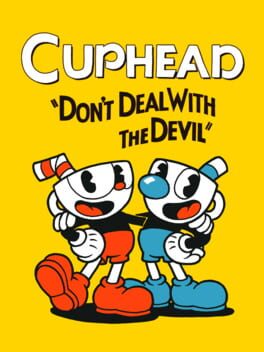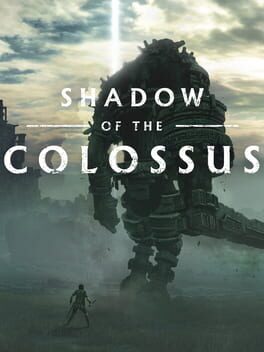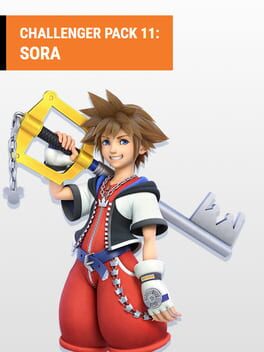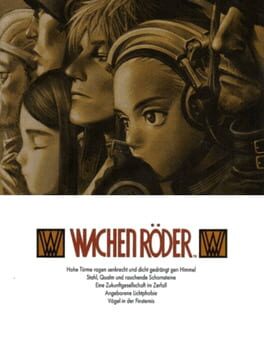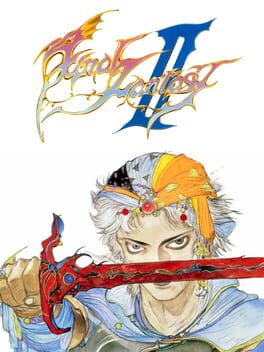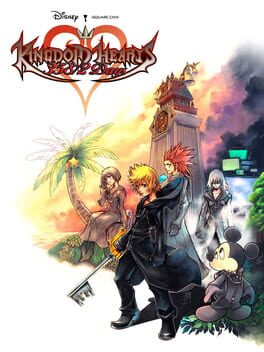Raphael
23 Reviews liked by Raphael
Daiteikoku
2011
Cuphead
2017
Wachenröder
1998
Final Fantasy II
1988
8-bit games often feel strangely lonely and alienating to me. Do you feel like this? I can't really put my finger on why, exactly. Maybe it's because so many of them are such well-trodden ground by now, that it feels like everyone else has been and gone, leaving me alone, crawling amongst the wreckage the words of others have left behind.
Few games tap into that feeling more than the much-maligned Final Fantasy II. There's really no way to say this without sounding hyperbolic/unhinged/pretentious, but it's a game that I am absolutely convinced has a true Soul, one that exists beyond the cartridge, and in the heart and imagination. In the same way that many people develop emotional attachments to their cars and end up attaching human characteristics to their errors and singularities, evolving them into quirks and endearing character flaws, Final Fantasy II's straining ambition gives it an utterly human character to me, a mess of quirks and ideas and wholly distinctive character traits that are entirely its own. Even when the game has serious issues that can impact my enjoyment - namely, the dungeon designs, the one part of the game I find largely indefensible - I find myself endeared to it completely. "Oh, you, FF2!"
There is no other game quite like Final Fantasy II, and there probably never will be again, simply because we now have so much ingrained knowledge of how systems like these are supposed to work, how stories like this are supposed to be told. The lessons learned from games like Final Fantasy II have taken root in the future, but in so doing, the games themselves have been left to languish in retrospect's austere halls.
If I had to sum up the soul of this game, I'd say that it's character can be drawn out through one of my favorite anecdotes in video game history (https://twitter.com/woodaba2/status/1331685180285874176?s=20), the story of how Ultima, the spell sought after by the heroes that Minwu, the most stalwart and useful of the guest party members, gives his life to unseal, only to find it ultimately useless. Although "fixed" in subsequent releases, the emotions this bug inspires live on in the "correct" implementation of Ultima, that being it growing in power the more spells you have mastered, and it takes quite some mastery to push it beyond the bounds of Flare. Even if you do unleash it's full power, that power comes from the user, not the spell: in the hands of a party member without spells, Ultima is powerless.
Unintentional though it may have been, this moment is core to the heart of Final Fantasy II and why it remains incredibly impactful to this day. Common storytelling logic - and, indeed, the original intention of the script - holds that Minwu's death would allow the heroes to find the weapon they need to overthrow the evil Emperor once and for all, but the programming of Final Fantasy II, astonishingly present thanks to the myriad bugs and systemic quirks the game is infamous for, rebels against this idea. "No," it says. "Ultima is but the loudest cry of a far bygone age, echoing almost silently into the future. Minwu died for nothing."
When Aerith dies in Final Fantasy VII, the party is struck by the suddenness of it, but eventually come to understand that she died casting a spell that may save the planet. They can find meaning in what she died doing, even as they mourn the death itself. But in Final Fantasy II, people die and often, their deaths are senseless and without meaning. Perhaps characters like Gordon, who dies from his wounds in his bed, marking your first real mission for the Rebel Army a failure, may have inspired tragic cutscenes in a SNES or PS1 RPG (though I should stress that this game does have the integral addition of choreographed cutscenes punctuating critical moments, but I'll let New Frame Plus discuss it better in their excellent video: https://www.youtube.com/watch?v=xapVOKEMk6A), but here, a death like this brings with it only the hole they leave in your party, a wound on the very battle screen that no one can entirely replace.
Not to say that characters are entirely mechanical, like they are in the original, but certainly the game leverages the mechanical boosts the guest characters offer you to make you truly feel their absence. Despite his sparse dialogue, Minwu, the ass-kicking white mage sporting one of early FF's best designs is beloved by fans because he is a crucial asset in battle, and his loss is deeply felt by a party that has no doubt by this stage come to depend on him. Your permanent party members, the vectors through which you'll explore the game's revolutionary levelling system - now thoroughly jacked by The Elder Scrolls, becoming the foundation for the most popular RPG in the world - wherein your characters grow organically through play from orphans who are destroyed in the first battle of the game to distinct archetypes of your own choosing. In my last playthrough, Firion became a master of bows and magics, while Maria took up Leon's fallen sword and became a dual-wielding powerhouse. You can become incredibly powerful in your chosen niches quite quickly in the remakes of this game...not that it will help you against the might of Palamecia.
Victories against the Empire are hard-won, difficult to come by, and often, negligible or even fruitless. Even slaying the Emperor in his palace only allows him to rise again, more powerful than ever before, as the Emperor of Hell itself. By the time you begin the final assault on Pandaemonium, there's a very real sense that there's not much of the world left to save, so devastated has it been by the conflict, leaving you wandering alone in the wreckage of the world listening to the crucially melancholy overworld theme (https://youtu.be/SaCLoLBdxTU). A later Squaresoft title on the PS1 leaves its world in a similar state going into the final dungeon, but it never hit me there quite like it does here because that game is filled with so much exposition and character moments that there's so much else to think about and consider. Final Fantasy II drowns you in the sensory silence of it's empty world, and it is deafening.
But still, you press on.
For those you have lost. For those you can yet save.
Because the deaths of Minwu and the others, they can't have been for nothing.
You can't let them be for nothing.
Most people don't get out of this game what I do. Heck, even I often don't get out of this game what I do in my moments of highest appreciation for it, as it exists in experiential aggregate, forgetting the miserable dungeons and the way the game is almost completely broken in it's original form. But there's no doubt in my mind that this is a special game, that does very special things. You may argue that those things are unintentional, sure, but does that matter? Games like Metroid II: The Return of Samus have come to be seen in bold and incisive ways that grow beyond their original intentions, so allow me to plant my flag and say that Final Fantasy II deserves to be acknowledged and appreciated much the same, as a defiant Wild Rose, rather than be left to wither and dry up on a sad, lonely outpost on the road to a future that left it behind.
Few games tap into that feeling more than the much-maligned Final Fantasy II. There's really no way to say this without sounding hyperbolic/unhinged/pretentious, but it's a game that I am absolutely convinced has a true Soul, one that exists beyond the cartridge, and in the heart and imagination. In the same way that many people develop emotional attachments to their cars and end up attaching human characteristics to their errors and singularities, evolving them into quirks and endearing character flaws, Final Fantasy II's straining ambition gives it an utterly human character to me, a mess of quirks and ideas and wholly distinctive character traits that are entirely its own. Even when the game has serious issues that can impact my enjoyment - namely, the dungeon designs, the one part of the game I find largely indefensible - I find myself endeared to it completely. "Oh, you, FF2!"
There is no other game quite like Final Fantasy II, and there probably never will be again, simply because we now have so much ingrained knowledge of how systems like these are supposed to work, how stories like this are supposed to be told. The lessons learned from games like Final Fantasy II have taken root in the future, but in so doing, the games themselves have been left to languish in retrospect's austere halls.
If I had to sum up the soul of this game, I'd say that it's character can be drawn out through one of my favorite anecdotes in video game history (https://twitter.com/woodaba2/status/1331685180285874176?s=20), the story of how Ultima, the spell sought after by the heroes that Minwu, the most stalwart and useful of the guest party members, gives his life to unseal, only to find it ultimately useless. Although "fixed" in subsequent releases, the emotions this bug inspires live on in the "correct" implementation of Ultima, that being it growing in power the more spells you have mastered, and it takes quite some mastery to push it beyond the bounds of Flare. Even if you do unleash it's full power, that power comes from the user, not the spell: in the hands of a party member without spells, Ultima is powerless.
Unintentional though it may have been, this moment is core to the heart of Final Fantasy II and why it remains incredibly impactful to this day. Common storytelling logic - and, indeed, the original intention of the script - holds that Minwu's death would allow the heroes to find the weapon they need to overthrow the evil Emperor once and for all, but the programming of Final Fantasy II, astonishingly present thanks to the myriad bugs and systemic quirks the game is infamous for, rebels against this idea. "No," it says. "Ultima is but the loudest cry of a far bygone age, echoing almost silently into the future. Minwu died for nothing."
When Aerith dies in Final Fantasy VII, the party is struck by the suddenness of it, but eventually come to understand that she died casting a spell that may save the planet. They can find meaning in what she died doing, even as they mourn the death itself. But in Final Fantasy II, people die and often, their deaths are senseless and without meaning. Perhaps characters like Gordon, who dies from his wounds in his bed, marking your first real mission for the Rebel Army a failure, may have inspired tragic cutscenes in a SNES or PS1 RPG (though I should stress that this game does have the integral addition of choreographed cutscenes punctuating critical moments, but I'll let New Frame Plus discuss it better in their excellent video: https://www.youtube.com/watch?v=xapVOKEMk6A), but here, a death like this brings with it only the hole they leave in your party, a wound on the very battle screen that no one can entirely replace.
Not to say that characters are entirely mechanical, like they are in the original, but certainly the game leverages the mechanical boosts the guest characters offer you to make you truly feel their absence. Despite his sparse dialogue, Minwu, the ass-kicking white mage sporting one of early FF's best designs is beloved by fans because he is a crucial asset in battle, and his loss is deeply felt by a party that has no doubt by this stage come to depend on him. Your permanent party members, the vectors through which you'll explore the game's revolutionary levelling system - now thoroughly jacked by The Elder Scrolls, becoming the foundation for the most popular RPG in the world - wherein your characters grow organically through play from orphans who are destroyed in the first battle of the game to distinct archetypes of your own choosing. In my last playthrough, Firion became a master of bows and magics, while Maria took up Leon's fallen sword and became a dual-wielding powerhouse. You can become incredibly powerful in your chosen niches quite quickly in the remakes of this game...not that it will help you against the might of Palamecia.
Victories against the Empire are hard-won, difficult to come by, and often, negligible or even fruitless. Even slaying the Emperor in his palace only allows him to rise again, more powerful than ever before, as the Emperor of Hell itself. By the time you begin the final assault on Pandaemonium, there's a very real sense that there's not much of the world left to save, so devastated has it been by the conflict, leaving you wandering alone in the wreckage of the world listening to the crucially melancholy overworld theme (https://youtu.be/SaCLoLBdxTU). A later Squaresoft title on the PS1 leaves its world in a similar state going into the final dungeon, but it never hit me there quite like it does here because that game is filled with so much exposition and character moments that there's so much else to think about and consider. Final Fantasy II drowns you in the sensory silence of it's empty world, and it is deafening.
But still, you press on.
For those you have lost. For those you can yet save.
Because the deaths of Minwu and the others, they can't have been for nothing.
You can't let them be for nothing.
Most people don't get out of this game what I do. Heck, even I often don't get out of this game what I do in my moments of highest appreciation for it, as it exists in experiential aggregate, forgetting the miserable dungeons and the way the game is almost completely broken in it's original form. But there's no doubt in my mind that this is a special game, that does very special things. You may argue that those things are unintentional, sure, but does that matter? Games like Metroid II: The Return of Samus have come to be seen in bold and incisive ways that grow beyond their original intentions, so allow me to plant my flag and say that Final Fantasy II deserves to be acknowledged and appreciated much the same, as a defiant Wild Rose, rather than be left to wither and dry up on a sad, lonely outpost on the road to a future that left it behind.
a more confident, accomplished, and nuanced use of deliberately tedious game mechanics than almost any other game yet made, that will struggle to be popularly recognized as such because it stars mickey mouse and tetsuya nomura OCs, and also because square enix have done their best to erase the actual game from existence and leave only a bad compilation movie in its place.
uses the framework of daily missions handed out by actively malicious older men exploiting the identity crises and ennui of teenagers to explore the simple but ever-present existential nightmare that is Work, the hold it has over our lives and the fact that we're just expected to Deal With It without any reason or justification, as well as the uniquely cruel violence of enforced identity society enacts on the young. all this and one of the medium's best accidental trans narratives. if this had Grasshopper Manufacture's logo on it instead of H.A.N.D we'd be neck-deep in thinkpieces every single day.
the co-op multiplayer is neat but also extremely baffling for a game that is Like This. imagine if Pathologic 2 had a separate co-op mode where the Bachelor, Harsupex, and Changeling ran through the termitary competing for a high score and that's the vibe
uses the framework of daily missions handed out by actively malicious older men exploiting the identity crises and ennui of teenagers to explore the simple but ever-present existential nightmare that is Work, the hold it has over our lives and the fact that we're just expected to Deal With It without any reason or justification, as well as the uniquely cruel violence of enforced identity society enacts on the young. all this and one of the medium's best accidental trans narratives. if this had Grasshopper Manufacture's logo on it instead of H.A.N.D we'd be neck-deep in thinkpieces every single day.
the co-op multiplayer is neat but also extremely baffling for a game that is Like This. imagine if Pathologic 2 had a separate co-op mode where the Bachelor, Harsupex, and Changeling ran through the termitary competing for a high score and that's the vibe
